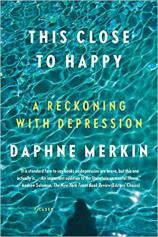This Close to Happy: A Reckoning with Depression
Review
This Close to Happy: A Reckoning with Depression
“Lately I’ve been thinking about the allure of suicide again.”
Now there’s a book you don’t want to read. And Daphne Merkin, the author of that book, understands. Clinical depression, she writes, is a “sadness that no one seems to want to talk about in public, not even in this Age of Indiscretion.”
So let’s start again. With behavior. Your behavior.
Ever sleep late, get out of bed, decide there’s nothing you want to do --- and return to bed?
Ever go to a party, delight others with your wit and charm, and come home feeling like a total loser?
Ever feel that sadness and despair sit on your shoulder, like invisible demons that no one but you can see and feel?
Ever crave this kind of relief: “No more rage at the circumstances that have brought you down. No more dread. No more going from day to day in a state of suspended animation, feeling tired around the eyes --- behind them, too --- and making conversation, hoping no one can tell what’s going on inside. No more anguish… Most of all, no more disguise, no more need to wear a mask…”
Many of us feel that way…once in a while. When you feel that way most of the time, you’re seriously depressed. There’s nothing romantic about that --- Merkin calls it an “unexotically normal psychological albatross.”
"Sixteen years in the writing, it is a brisk 288 pages of personal revelation and the kind of general perception that gives you information you didn’t know about yourself. Above all, it’s compelling."
Here’s the weird part: All her life Daphne Merkin has been a productive, accomplished writer. She won a poetry prize at Barnard when she was 20, was published in the Times at 21. Her byline has appeared on a zillion articles. Her books --- like THE FAME LUNCHES: On Wounded Icons, Money, Sex, the Brontës, and the Importance of Handbags — are highly praised. As is THIS CLOSE TO HAPPY. Sixteen years in the writing, it is a brisk 288 pages of personal revelation and the kind of general perception that gives you information you didn’t know about yourself. Above all, it’s compelling. To read excerpts, click here and here. [To buy the book from Amazon, click here. For the Kindle edition, click here.]
Daphne Merkin’s accomplishments are more impressive when you discover what her childhood was like. She was the fourth of six children, the third girl. Her parents were rich; they lived in a big apartment on Park Avenue. But they didn’t live rich because they were refugees. Her father was remote, and most of her mother’s family that didn’t die in the Holocaust lived in reduced circumstances in Israel. Her family life was thus a basket of issues.
Her mother, Merkin writes, “was only nice to me when I was sick.” And she got seriously sick at eight: “I was wholly unwilling to attend school, out of some combination of fear and separation anxiety.” That led to her first hospitalization. There would be more.
This was her mother: “‘Your tears don’t move me,’ she’d tell me repeatedly when I cried as a little girl. And she’d warn, ‘You’ll feel my five fingers in your face,’ right before slapping me.” Her nanny was no better. When Daphne fought with her brother, she began “banging my head against the wall.” Decades later, when she rushed home to tell her mother that a piece of fiction she’d written had been accepted by The New Yorker, the response was “Your nose looks big when you smile.”
And yet her mother --- narcissist, tyrant, abuser --- is the major character in Merkin’s life story. And her therapy. And in an all-pervasive unhappiness that makes an early exit appealing: “Self-inflicted death has always held an allure for me. I am fascinated by people who have the temerity to bring down the curtain on their own suffering, who don’t hang around moping in hopes of a brighter day.”
Daphne Merkin and I have been friends for a decade. I never saw any of her despair. Her one quirk has been a persistent tardiness --- she tends to arrive at dinner as the entrée is being served. I joked that she’s “the late Daphne Merkin.” Now I know how not a joke that is.
Are you thinking: “Get over yourself, girlfriend. You are rich and privileged and you have a jewel of a daughter and your friends love you.”
You think she doesn’t know that?
“I know I lead a privileged existence, I know there are people hanging on by a thread in Haiti and the Congo and elsewhere across the globe, I know, I know, I know… But I still can’t get out of being me.”
And she knows the trouble with therapy; you can understand the past, but you can’t change it. And the trouble with medication; you can dull the pain, but you can’t erase it. So what’s the point of decades of navel gazing? And the constant adjustment of meds?
Merkin doesn’t mention this song, written by Lucinda Williams. But it is the point.
And this is the point of the book:
“I got a letter from a woman saying, ‘Had my sister read your piece, maybe she would have gone to the hospital and not committed suicide.’ I feel like I write for people like this. I hope that doesn’t sound grandiose.”
It’s been eight years since her last stint in a hospital. The book’s final sentence: “Whoever thought I’d be this close to happy?” Hang in, girlfriend.
Reviewed by Jesse Kornbluth for HeadButler.com on February 10, 2017
This Close to Happy: A Reckoning with Depression
- Publication Date: February 27, 2018
- Genres: Memoir, Nonfiction
- Paperback: 304 pages
- Publisher: Picador
- ISBN-10: 1250159296
- ISBN-13: 9781250159298





